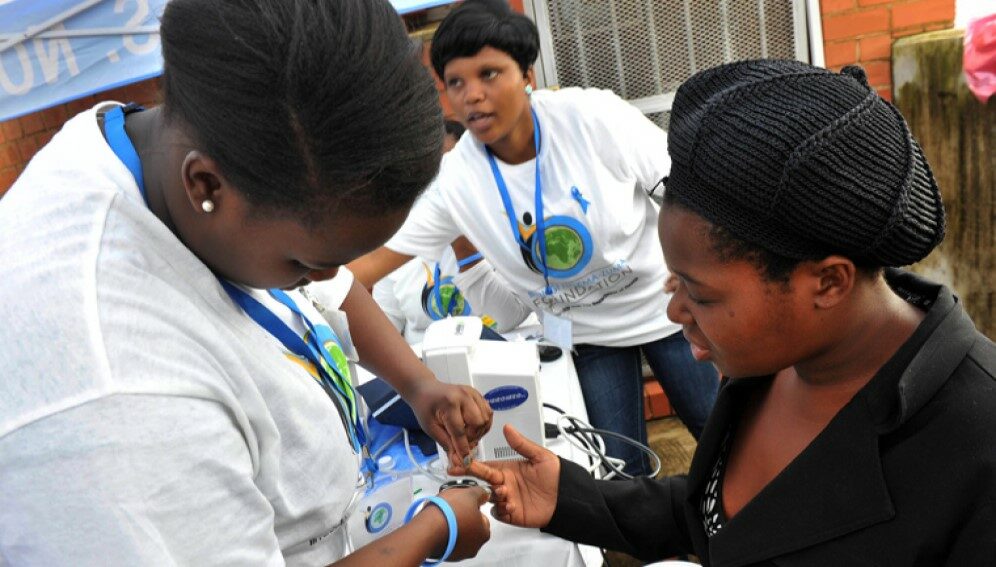12/11/21
Diabetes in Africa ‘could reach 55mln by 2045’

By: Royal Uche
Send to a friend
The details you provide on this page will not be used to send unsolicited email, and will not be sold to a 3rd party. See privacy policy.
[LAGOS] The number of Africans with diabetes could more than double in the next 25 years, the International Diabetes Federation (IDF) warns, while COVID-19 patients with the condition face greater risks according to a separate report.
Diabetes cases in the region could rise by 134 per cent from 24 million in 2021 to 55 million by 2045, according to the IDF’s latest Diabetes Atlas, which says that 537 million adults are now living with the disease worldwide.
“Fighting the diabetes epidemic in Africa is in many ways as critical as the battle against the current [COVID-19] pandemic.”
Benido Impouma, WHO Regional Office for Africa.
Poor access to COVID-19 vaccines is increasing Africa’s death rates from COVID-19 infections among patients with diabetes, a WHO preliminary analysis adds.
The WHO evaluated data from 13 African countries — Burkina Faso, Chad, Cote d’Ivoire, Democratic Republic of the Congo, Eswatini, Guinea, Namibia, Niger, Rwanda, Sao Tome and Principe, Senegal, Seychelles and Uganda — on Africans with diabetes who also tested positive for COVID-19.
The findings, which were released at a WHO virtual press conference yesterday (11 November) in advance of World Diabetes Day on 14 November, show that 10.2 per cent of Africans with diabetes died from COVID-19 compared with just 2.5 per cent for all patients with COVID-19.
“From all indications, COVID-19 is delivering a clear message. Fighting the diabetes epidemic in Africa is in many ways as critical as the battle against the current [COVID-19] pandemic,” said Benido Impouma, director at the Communicable and Noncommunicable Diseases Cluster at the WHO Regional Office for Africa.
Impouma added that people with diabetes in countries around the world have been prioritised to receive care during the COVID-19 pandemic but Africa has faced challenges implementing this strategy.
He said access to diabetes care had been severely disrupted in the WHO African region, adding that lockdowns implemented to limit the spread of COVID-19 impeded access to healthcare and basic disease management including routine monitoring of blood sugar levels and eating a healthy diet.
Impouma added that despite COVID-19 vaccine being a lifesaver for those with other diseases such as diabetes, access to the vaccines remains poor. Nine months since COVID-19 vaccination campaigns began in Africa, only 6.6 per cent of the African population is fully vaccinated against COVID-19 compared with about 40 per cent globally.
“We are still nowhere near where we need to be with protecting our most vulnerable,” Impouma explained. “There is an urgent need to step up vaccination and other key services to people at high risk, including those with diabetes. We can also stop diabetes from claiming more lives by promoting healthy, affordable diets and regular exercise.”
Greg Tracz, chief executive officer of Diabetes Africa, told SciDev.Net: “We can reduce the impact of COVID-19 in Africa if we start by preventing and treating diabetes. Innovations exist, [and] champions exist across the continent. We need to share information and communicate better.”
Eva Njenga, the chairman of the Kenya Diabetes Management and Information Centre, said that over 40 per cent of people who were dying from COVID-19 have other diseases including diabetes in Kenya, leading the government to prioritise COVID-19 vaccination of such people living in Kenya.
Maïmouna Ndour Mbaye, director of the National Diabetes Centre in Senegal, added that a significant number of Africans with diabetes can no longer control their condition because of the high cost of medicines and monitoring devices.Mbaye urged African leaders to subsidise medicines for controlling diabetes, adding that the government of Senegal has subsidised insulin to allow more people to have access to the life-saving medication.
This piece was produced by SciDev.Net’s Sub-Saharan Africa English desk.













